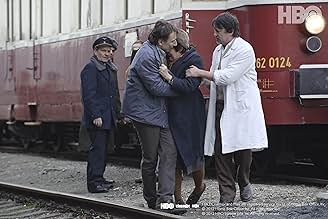This is not just the story of Jan Palach and his self-immolation in protest against the political oppression of the communists in Czechoslovakia 1969 but also the story of many people involved in his case, especially his mother.
There are some extremely sensitive scenes in this tremendous film of how political oppression works with its fatal immeasurable consequences for individuals, whose lives more often than not are ruined by bureaucrats who are unaware of it but victims themselves of the system.
The mother here is an ordinary elderly lady, one of hundreds of thousands of mothers whose sufferings, fates and quiet martyrdom never become known, but the focus of this film is lifting forth this mother with an overwhelming impression on those who must empathize with her. It's the most difficult part, and the actress playing her is more than just convincing - it is, as Polanski would have termed it, totally organic. The psychological torture she is subjected to for suing the authorities for slandering her son after his suicide is more cruel than any physical torture and must break her to mind and soul.
This film is almost documentary in its detailed psychological account of this sensitive case with all its victims and at the same time a masterpiece of suspense. I have never seen anything like it, while closest to it might be Margaretha Von Trotta's similar psychological insightful next-to documentaries of human suffering under autocracies of mental cruelty more severe and evil than any ordinary open cruelty for its carefully intentional inhumanity.
Still, Agnieszka Holland makes you understand all these pawns of fate as no more than human caught up in the human destructiveness of totalitarianism, which gets worse the longer it lasts, the only comfort of which is that it is always doomed.
The original film is almost 4 hours, there is a slightly abbreviated version of only 3, but it is well worth acquiring the longer version.








































